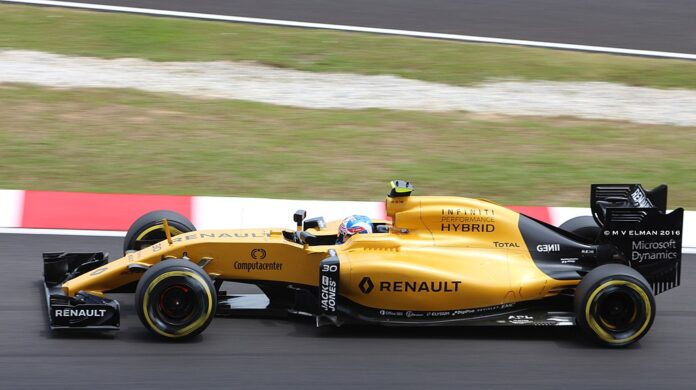The French automaker’s decision signals the end of a nearly 50-year legacy in Formula 1 as Alpine prepares to source engines from Mercedes starting in 2026
Renault has officially announced the termination of its Formula 1 engine program following the 2025 season, marking a significant shift in the company’s motorsport strategy. This decision means that Alpine, Renault’s F1 team, will need to purchase engines from another manufacturer, most likely Mercedes, starting in 2026.
The Renault F1 engine facility located in Viry-Chatillon, Paris, will pivot away from F1 engine development to focus on the creation of electric motor and battery technologies. The move reflects the company’s commitment to transitioning towards more sustainable automotive solutions while still maintaining involvement in motorsport.
Embed from Getty ImagesRenault has been a key player in Formula 1 since its debut in 1977 when it introduced the sport’s first turbocharged engine. Over the decades, the French automaker has established itself as one of the most successful engine suppliers in F1 history, clinching 10 constructors’ titles and nine drivers’ championships. Legendary drivers such as Michael Schumacher, Alain Prost, Sebastian Vettel, and Fernando Alonso have all driven cars powered by Renault engines, achieving remarkable success with teams like Williams, Benetton, and Red Bull Racing.
Despite its storied history, Renault’s performance in F1 has waned in recent years, particularly since the introduction of hybrid power units in 2014. After a brief resurgence with a fourth-place finish in the constructors’ championship in 2020 and 2022, the Alpine team slipped to sixth in 2023 and currently languishes in ninth place out of ten teams with just six races remaining in the 2024 season.
While the announcement of the end of the F1 engine program comes amidst ongoing challenges, it had been anticipated within the F1 community for several months. Renault’s statement made little mention of the implications of this decision, only affirming that F1 operations at Viry would continue until the end of the 2025 season.
Recently, protests from employees at Renault’s motorsport base in Paris highlighted growing discontent about the future of the F1 program. Talks with Renault CEO Luca de Meo sought to address these concerns but ultimately did not alter the course of the company’s strategy.
In a bid to retain expertise within the organization, Renault has pledged to establish an “F1 monitoring unit.” This initiative aims to preserve the knowledge and skills of its employees in the realm of motorsport innovation. Affected employees will be offered positions in the newly formed Alpine Hypertech, which will focus on various projects including the World Endurance Championship, Formula E, and rally-raid programs.
The Alpine F1 team issued a statement clarifying that the decision to end the F1 engine program was made at the group level, asserting their commitment to focusing on the 2024 FIA Formula 1 World Championship and striving for the best possible results for the remainder of the season.
Analysis:
Political:
Renault’s decision to withdraw from its F1 engine program is significant not only for the company but also for the broader landscape of motorsport and automotive innovation. The shift aligns with the increasing global emphasis on sustainability and the transition to electric vehicles, reflecting a growing trend among automakers to prioritize eco-friendly technologies over traditional combustion engines. As countries implement stricter emissions regulations and promote electric mobility, Renault’s strategic pivot resonates with political narratives surrounding climate change and environmental responsibility.
This decision may also affect the competitive dynamics in Formula 1, particularly as teams increasingly rely on partnerships with manufacturers for engine supply. The potential shift of Alpine to Mercedes engines could strengthen Mercedes’ dominance in the sport while raising questions about competitive balance and innovation in the coming seasons.
Social:
The conclusion of Renault’s F1 engine program brings to light the evolving perceptions of motorsport, particularly in relation to environmental concerns. As fans become more conscious of sustainability issues, the popularity of electric racing series like Formula E is on the rise. This reflects a broader societal shift towards valuing eco-friendly practices, not only in sports but across various industries.
Moreover, Renault’s commitment to maintaining a workforce skilled in motorsport despite the end of the F1 engine program signals a recognition of the social value of preserving expertise and innovation. This move can serve to reassure employees and fans that while Renault is stepping back from F1, it remains dedicated to advancing motorsport through other avenues.
Gender:
Renault’s departure from F1 highlights ongoing discussions about gender representation in motorsport. Despite the sport’s male-dominated history, recent efforts to promote diversity and inclusion have gained traction, particularly through initiatives aimed at supporting female drivers and engineers. As Renault pivots its focus to electric technologies, there may be opportunities to engage more women in roles traditionally occupied by men, such as engineering and management, thereby promoting gender equality within the industry.
Economic:
Economically, Renault’s decision to end its F1 engine program signals a shift in priorities that could have lasting implications for both the company and the sport. While the costs associated with maintaining a competitive F1 engine program are substantial, redirecting resources toward electric vehicle development aligns with the anticipated growth of the EV market. This strategic realignment could ultimately benefit Renault by positioning the company as a leader in sustainable automotive technology.
Moreover, the purchase of engines from another manufacturer, likely Mercedes, will impact Alpine’s budget and competitiveness within the sport. The financial dynamics of F1 are shifting, with an increased emphasis on collaboration and partnerships among teams and manufacturers, suggesting a new economic landscape where shared resources may become more commonplace.
